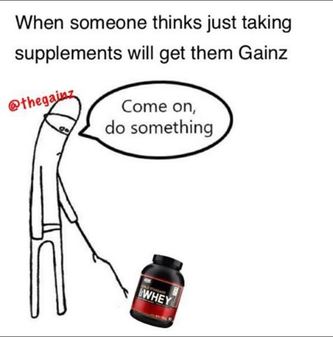|
So what supplements do you really need? You don’t NEED any supplements. All of your goals can be achieved without breaking your bank account. If you have a varied diet, all of your macro nutrients (protein, carbohydrates and fats) and micro nutrients (vitamins and minerals) requirements can be met… without ANY supplementation.
However, some supplements can be beneficial in helping you fill in gaps in your diet. Some supplements can even help you reach your goals in the weight room or on the field and then you have some to even help you with your recovery process. I will go through two types of supplements in this post, supplements for daily health (for the average person) and supplements for sport or bodybuilding (for the active, exercising individual). 1) Supplements for general wellbeing: Multivitamin: To fill in the gaps in your diet and to make sure you get in enough of the vital vitamins and minerals. Vitamins and minerals play an important role in our bodies and most people don’t get in enough micronutrients from food sources alone. Omega 3&6: This should be used for optimal functioning of all the parts of our body, especially our hormones and brain. Omegas contain anti-inflammatory and antioxidant properties. It can help with muscle soreness as well as increasing protein synthesis, which means more muscle gains. Vitamin D: This can be used to support the health of our bones, teeth, muscle and immune system and enhancing the absorption of minerals. Vitamin D is essential for the absorption of Calcium. This vitamin is rarely found in foods. Calcium: It is used for developing and maintaining strong bones and preventing bone loss and osteoporosis in later life. Other functions of Calcium include muscle function, transmission of nerves and the secretion of hormones. 2) Supplements for sport & strength training: Whey protein: Whey can be used to meet your protein goals for the day if you’re not a fan of meats or poultry. It also improves your muscles’ ability to recover after exercise and can even lead to increases in muscle mass and strength. Creatine Monohydrate: It’s a natural occurring supplement that can enhance power and build muscle (to some extent). I dedicated a blog post to the ins and outs of Creatine, just search for it in my blog section. BCAA’s: Short for Branched Chain Amino Acids, they can speed up the recovery and repair process. If you’re sore after workouts, these (or Glutamine) are your best shot at decreasing soreness. Glutamine: It is also an amino acid and particularly helps with the recovery and repair process since it removes excess ammonia that build up in the body and lead to sore, tight muscles. Caffeine: This stimulant is your cheapest form of Pre-Workout. It can increase alertness, decrease fatigue, increase pain tolerance and even burn fat. It is beneficial for both endurance training and resistance training. Now that we’ve gone over some different supplements for different needs, you can choose whatever suits your needs. There’s no need to have a kitchen cupboard full of supplements if you don’t actually need to take any of it.
0 Comments
Leave a Reply. |
Blog about exercise & nutrition
Archives
June 2018
|


 RSS Feed
RSS Feed